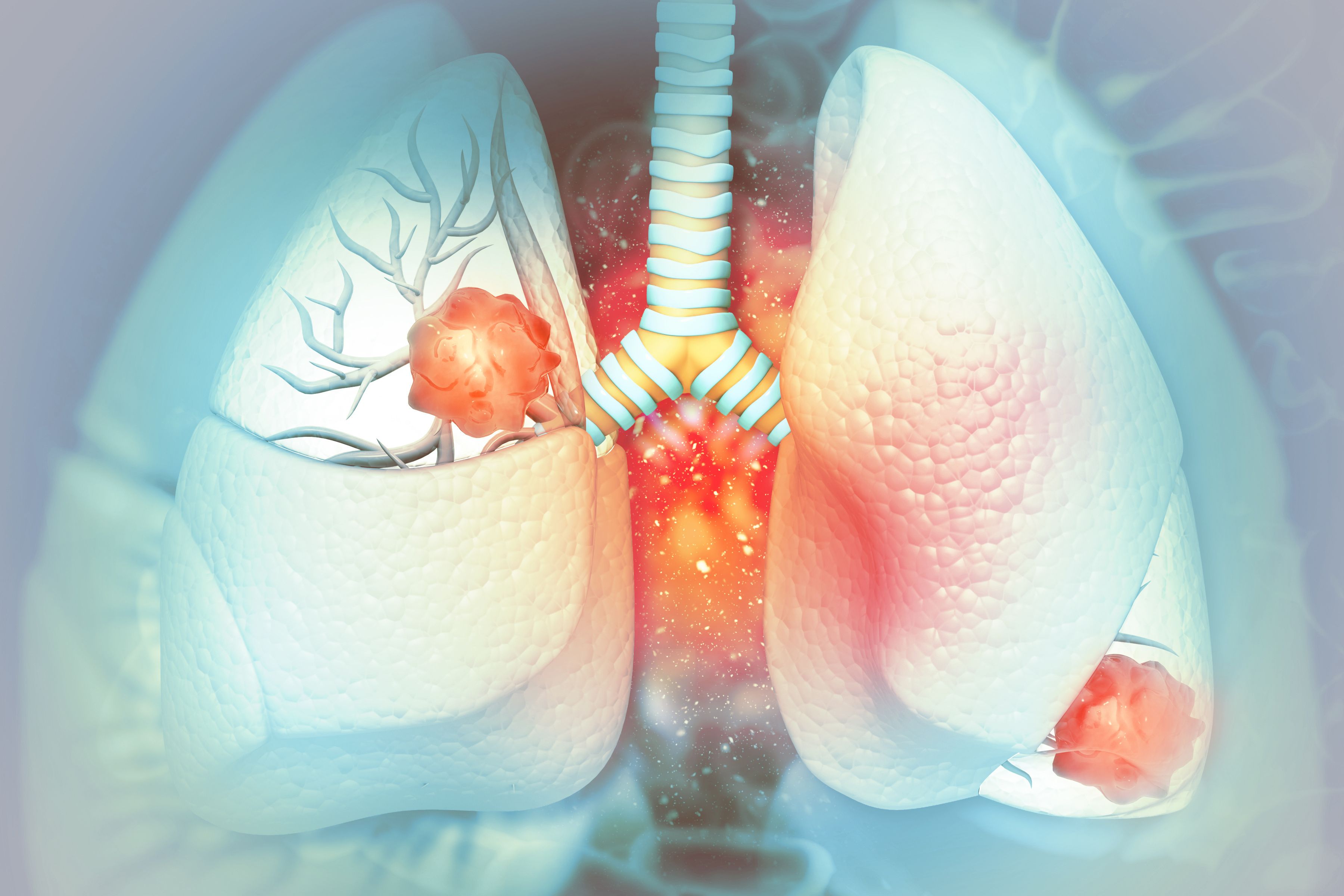Phase 1 Study of Galinpepimut-S and Nivolumab Meets Primary End Point in MPM
In a phase 1 study of 10 evaluable patients with refractory/relapsed malignant pleural mesothelioma, the median overall survival was 17.6 months for patients treated with the combination of galinpepimut-S and nivolumab.
Lung Cancer: © Crystal Light - stock.adobe.com

The combination of galinpepimut-S and nivolumab (Opdivo) met the primary end point of safety and efficacy in patients with refractory/relapsed malignant pleural mesothelioma (MPM), according to follow-up data from a phase 1 investigator-sponsored trial.1
Among the 10 evaluable patients enrolled in the phase 1 study, the median overall survival (OS) was 17.6 months for patients treated with the combination (n = 9), 13.5 months for all 10 patients, and approximately 28 weeks for patients with relapsed/refractory disease treated with standard of care. For patients without galinpepimut-S immune response, the median OS was 9.0 months, and for patients with galinpepimut-S-specific immune response, the median OS was 27.8 months, making a 3-fold or 208.3% increase in survival time.
Of the patients who had a full immune response to galinpepimut-S, 66.7% of patients (n = 2) had an objective response. For patients who did not have an immune response to galinpepimut-S, only 1 patient (14.3%) had an objective response. Among all patients, the median progression-free survival (PFS) was 11.9 weeks, the disease control rate (DCR) was 30%, and 3 patients achieved stable disease per RECIST criteria with a tumor volume decrease of up to 17%.
“We are excited that in a bulky, measurable disease setting, such as in this relapsed/refractory advanced mesothelioma study, we have observed yet again strong [galinpepimut-S]-specific immune responses which appear to be correlated with significant survival benefit in patients when combined with checkpoint inhibitors, a more than 200% survival benefit,” said Angelos Stergiou, MD, ScD, h.c, president and chief executive officer of SELLAS, in a press release. “As we had hypothesized in the past, this increase in survival appears to be consistent with long-term immunity-mediated antitumor effect with our immunotherapy combination as we had seen in other studies with [galinpepimut-S], and, importantly, the positive survival outcomes seen in this study are accompanied with a safety profile which is similar to that of the checkpoint inhibitor alone.”
Galinpepimut-S works to target malignancies that overexpress Wilms Tumor 1 antigen. The product is made of 4 peptide chains, including 2 that are modified chains that elicit a strong, innate immune response against this antigen and access a wide range of human leukocyte antigens. Galinpepimut-S can potentially detect cancer cells, kill cancer cells, and provide support to the immune system to continue eliminating recurring and residual disease.2
The phase 1 study enrolled 10 patients, 9 of whom were given at least 3 doses of galinpepimut-S.3 The third dose of galinpepimut-S was given in combination with nivolumab. Of those enrolled, 9 patients (90%) had sufficient samples collected to be analyzed for galinpepimut-S-specific immune response.
Patients were required to have either received and progressed on or were refractory to frontline pemetrexed-based chemotherapy. Eight of the 10 patients were male, the median age of patients was 69 years, and all patients had MPM epithelioid and/or sarcomatoid variants. A total of 60% of patients had stage III or IV disease at the time of enrollment and initial tumor stages were I (n = 1), II (n = 3), III (n = 2), and IV (n = 4).
“We believe that these observed survival benefits in the active disease setting further confirm the strong biological effect of [galinpepimut-S] in even the most challenging settings where [galinpepimut-S] seems to contribute to stopping the progression of extremely aggressive cancers and demonstrates its utility as a potentially effective combination therapy.” added Stergiou.1
REFERENCES
SELLAS Life Sciences reports positive follow-up immune response and survival data in completed phase 1 study of galinpepimut-s combined with Opdivo® in advanced malignant pleural mesothelioma. News release. SELLAS Life Sciences Group, Inc. December 27, 2023. Accessed January 2, 2024. http://tinyurl.com/4dt3jxp7
Galinpepimut-S (GPS) therapy. SELLAS Life Sciences Group, Inc. Accessed January 2, 2024. https://www.sellaslifesciences.com/galinpepimut-s-gps-therapy/#section=therapy.
Using targeted cancer vaccine (galinpepimut-S) with immunotherapy (nivolumab) in mesothelioma. ClinicalTrials.gov. Updated August 2, 2023. Accessed January 2, 2024. https://classic.clinicaltrials.gov/ct2/show/NCT04040231